| Srl | Item |
| 1 |
ID:
134170
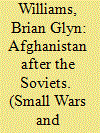

|
|
|
|
|
| Publication |
2014.
|
| Summary/Abstract |
In 1989 the Soviet Union withdrew its forces from Afghanistan leaving the embattled Afghan Communist government of President Mohammad Najibullah to fight against an emboldened mujahideen insurgency. Most experts expected a quick mujahideen victory once the Soviets were no longer directly involved in counterinsurgency operations in support of the Afghan government. But in the spring of 1989 the Afghan Communists beat the odds and defeated a mujahideen rebel offensive designed to capture the eastern city of Jalalabad. This proved to be a turning point, and for the next three years the Najibullah regime held out against the mujahideen 'freedom fighters'. In fact the Afghan Communist regime actually outlasted its sponsor the Soviet Union. The reasons for this remarkable achievement can be traced, in part, to ethnic-tribal divisions among the quarreling mujahideen parties and the Afghan government's ability to exploit them. This largely untold story has obvious implications for understanding the future of post-Karzai Afghanistan, tribalism, ethnicity, and foreign sponsorship in post-US Afghanistan. This article will explore the reasons for the resilience of the Najibullah Communist government and then assess possible implications for a post-2014 Afghan government.
|
|
|
|
|
|
|
|
|
|
|
|
|
|
|
|
| 2 |
ID:
112822
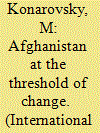

|
|
|
|
|
| Publication |
2012.
|
| Summary/Abstract |
ON DECEMBER 5, 2011, Bonn hosted a large-scale International Afghanistan Conference under the slogan "Afghanistan and the International Community: From Transition to the Transformation Decade" attended by high representatives of about 100 countries and international organizations, in short, practically the entire range of the world community. The conference met to look at ten years of post-Taliban development and reconfirm a broad international consensus on the Roadmap of the country's development after the draw-down of American and NATO contingents launched in the summer of 2011 and expected to be completed in 2014.
|
|
|
|
|
|
|
|
|
|
|
|
|
|
|
|
| 3 |
ID:
111780
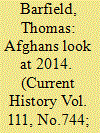

|
|
|
|
|
| Publication |
2012.
|
| Summary/Abstract |
"While many Afghans are highly ambivalent about the presence of foreign forces in their country, they fear a return to civil war even more."
|
|
|
|
|
|
|
|
|
|
|
|
|
|
|
|
| 4 |
ID:
156148
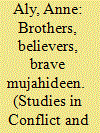

|
|
|
|
|
| Summary/Abstract |
The exponential growth in the use of the Internet and social media by terrorist actors and violent extremists has generated research interest into terrorism and the Internet. Much of this research is focused on the kinds of messages being spread via the various media platforms that host violent extremist content. This research has yielded significant insights into how organizations such as Al Qaeda and Islamic State craft their messages, the mediums they use to disseminate their messages, and the ways in which they reach their audiences. Yet we are still no closer to understanding why certain messaging appeals to certain people in certain ways and not to others. Within the literature on terrorism and the Internet, the audience—those individuals who receive messages, make meaning from them and then decide whether to act on them—is conspicuously missing. As a result, research into terrorism and the Internet can only hypothesize about the nature and extent of influence that terrorist messages wield. It is often based on an assumption that the violent extremist narrative works like a magic bullet to radicalize audiences already vulnerable and predisposed to becoming violent. Utilizing media theory approaches to studying the audience as an active agent in meaning-making, this article proposes a research framework for developing the current focus on terrorism and the Internet.
|
|
|
|
|
|
|
|
|
|
|
|
|
|
|
|
| 5 |
ID:
123224
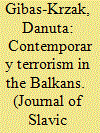

|
|
|
|
|
| Publication |
2013.
|
| Summary/Abstract |
The aim of this article is to examine the terrorism in the Balkans. Contemporary Islamic terrorism in the Balkans is caused by the increase of influences of Muslim fundamentalists, especially in Bosnia and Herzegovina. The origins of Islamic terrorism are connected with radical trend of this religion, which became popular in the society in the period of socialist Yugoslavia. However, this trend could be widespread on a larger scale only when Mujahideen came to Bosnia and Herzegovina to take part in the civil war. In Bosnia and Herzegovina, it was the religious fanatics who mainly participated in the fighting. Many of them were the members of terroristic organizations, such as Al-Qaeda, Hezbollah, Hamas, and Al-Gama'a al-Islamiyya. A considerable number of 'Warriors of Allah' remained on the territory of Bosnia and Herzegovina after the end of the civil war, thus, contributing to the development of the terrorist network connected with radical factions of Islam. The author emphasizes that is essential to take complex actions that aim to fight this threat by international cooperation of special services and the police as a part of the European Union (UE) mission. It is even more important since West Balkans actively participate in the UE and North Atlantic Treaty Organization (NATO) integration processes.
|
|
|
|
|
|
|
|
|
|
|
|
|
|
|
|
| 6 |
ID:
096706
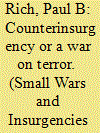

|
|
|
| 7 |
ID:
077182
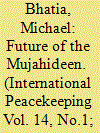

|
|
|
|
|
| Publication |
2007.
|
| Summary/Abstract |
Contemporary Afghan politics is marked by a debate over the 'mujahideen.' This contest involves the mythologizing, demythologizing and appropriation of the term by a wide variety of actors, from warlords, tribal combatants, the Taliban and Anti-Coalition Forces to rights activists and journalists. This struggle is a competition for legitimacy over the 'right to rule' and the 'right to conduct violence'; and it is critical to understanding the dilemmas of statebuilding in Afghanistan. Through such an examination, policy lessons are acquired concerning the role of the Afghan government and members of the international community in confronting armed groups
|
|
|
|
|
|
|
|
|
|
|
|
|
|
|
|
| 8 |
ID:
061144
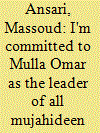

|
|
|
| 9 |
ID:
100392
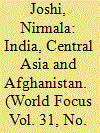

|
|
|
| 10 |
ID:
122446
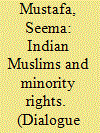

|
|
|
|
|
| Publication |
2013.
|
| Summary/Abstract |
Post 9/11, the West descended on India seeking answers to the one
question: why are Indian Muslims not terrorists? I attended any number
of 'private' meetings organized by embassies of the Western countries
in New Delhi with Muslims in India and their behavior patterns as the
sole issue for discussion. In the process one ate a variety of cuisines,
joining other carefully selected Muslims to help the missions and their
governments understand the 'peculiar' character of the Indian Muslims
that kept them away from the turbulence of Pakistan and the Middle
East, and secular in their response. Paradoxically, the official
Government of India position is that Indian Muslims are not terrorists,
even though covertly more and more are being arrested and detained
under various terror laws.
|
|
|
|
|
|
|
|
|
|
|
|
|
|
|
|
| 11 |
ID:
000743
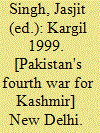

|
|
|
|
|
| Publication |
New Delhi, Knowledge world, 1999.
|
| Description |
xii, 342p.
|
| Standard Number |
8186019227
|
|
|
|
|
|
|
|
|
|
|
|
Copies: C:2/I:0,R:0,Q:0
Circulation
| Accession# | Call# | Current Location | Status | Policy | Location |
| 042173 | 355.0209546/JAS 042173 | Main | On Shelf | General | |
| 042174 | 355.0209546/JAS 042174 | Main | On Shelf | General | |
|
|
|
|
| 12 |
ID:
128605
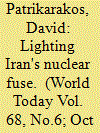

|
|
|
| 13 |
ID:
113610
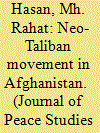

|
|
|
| 14 |
ID:
156217
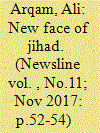

|
|
|
| 15 |
ID:
109052
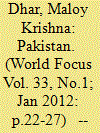

|
|
|
| 16 |
ID:
091983
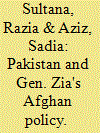

|
|
|
|
|
| Publication |
2009.
|
| Summary/Abstract |
The Soviet invasion of Afghanistan in December 1979 suddenly changed the geo-strategic environment of the region. Overnight Pakistan became the front-line state against the Soviet occupation as well as the principal channel through which military assistance was provided to the Afghan mujahideen(holy warriors).
|
|
|
|
|
|
|
|
|
|
|
|
|
|
|
|
| 17 |
ID:
113660
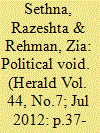

|
|
|
| 18 |
ID:
115474
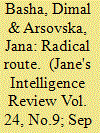

|
|
|
| 19 |
ID:
116428
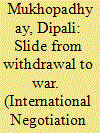

|
|
|
|
|
| Publication |
2012.
|
| Summary/Abstract |
Abstract The United Nations represented an organization of severely limited means during the Cold War. The Secretary-General's office became one of the few instruments in the UN system with the power to influence international relations, albeit in limited ways. As Afghanistan emerged from one war in 1989, it risked falling into another involving the various Afghan stakeholders left to fight each other in the wake of their victory over the Soviets. The office of the Special Representative to the Secretary-General emerged as a key exponent of "quiet diplomacy," as various emissaries shuttled across the globe working to prevent this fragile post-conflict state's return to violent conflict. The operating environment was saturated with mistrust as a result of superpower tensions, regional agendas, ethno-religious differences, and a highly militarized landscape. This article considers the geopolitical, institutional, operational, and personal dimensions of this diplomatic campaign from the time of Soviet withdrawal until 1992. Ultimately, the campaign's limitations overwhelmed its advantages and the Afghan state dissolved into a dark period of warlordism and violence. This article explores the reasons for the eventual failure of diplomacy and its implications for quiet diplomatic efforts that have resurfaced in Afghanistan since 2001.
|
|
|
|
|
|
|
|
|
|
|
|
|
|
|
|
| 20 |
ID:
102904
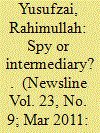

|
|
|